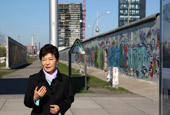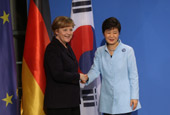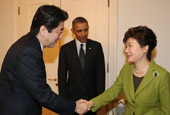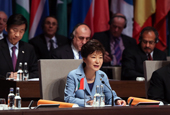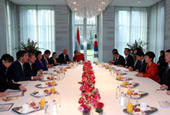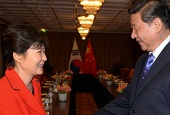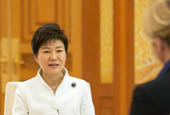President Park received an honorary doctorate degree in law from the Dresden University of Technology in the former East German city. The president proposed three visions of humanity, co-prosperity and integration in her acceptance speech, titled “An Initiative for Peaceful Unification on the Korean Peninsula.”
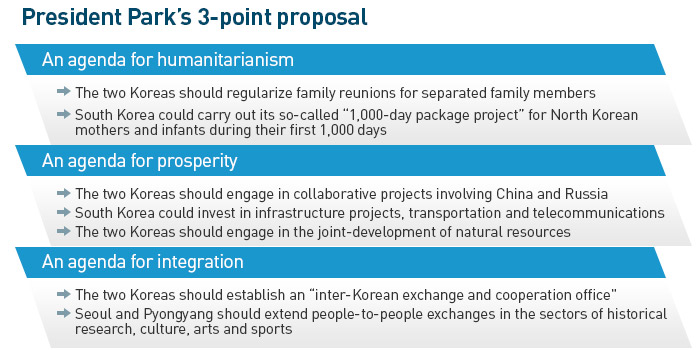
President Park said that South and North Korea need to widen their exchanges and cooperation. “What we need is not a one-off or promotional event, but the kind of interaction and cooperation that enables ordinary South Koreans and North Koreans to recover a sense of common identity, as they help each other,” said the president.
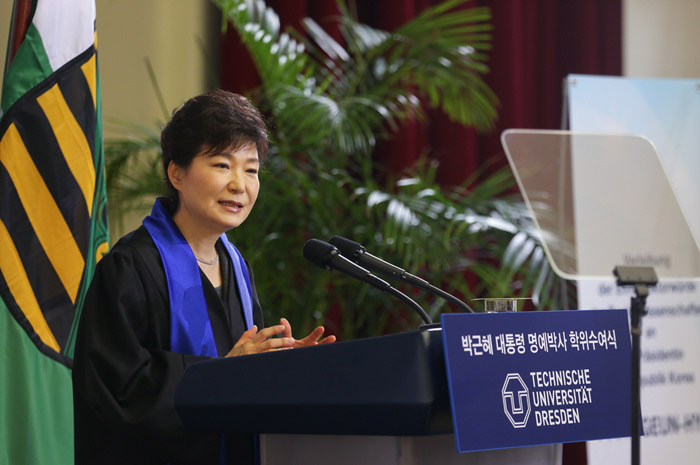
President Park Geun-hye proposes three steps to North Korea that would lead to the reunification of the Korean Peninsula on March 28 at the Dresden University of Technology. (photo: Cheong Wa Dae)
In the speech, she said, "Years of preparation by the people of East and West Germany eventually succeeded in turning the great dream of unification into reality and, ultimately, even transformed the future of Europe. A reunited Germany has taken its place at the heart of Europe.” She said that thanks to unification, Dresden has been transformed into a world-class city with advanced science and technology, as have other parts of the former East Germany.
“These are the images of a united Germany that encourage us in Korea to be confident in our hope and conviction that unification must also come to the Korean Peninsula,” said the president.
President Park said that she believes the Republic of Korea will similarly reach even greater heights after unification. “A unified Korea that is free from the fear of war and nuclear weapons will be well positioned to make larger contributions to dealing with a wide range of global issues, like international peace-keeping, nuclear non-proliferation, the environment and energy, and economic development.” As a new distribution hub linking the Pacific and Eurasia, the president added that the Korean Peninsula would contribute to the economies of East Asia and the rest of the world.
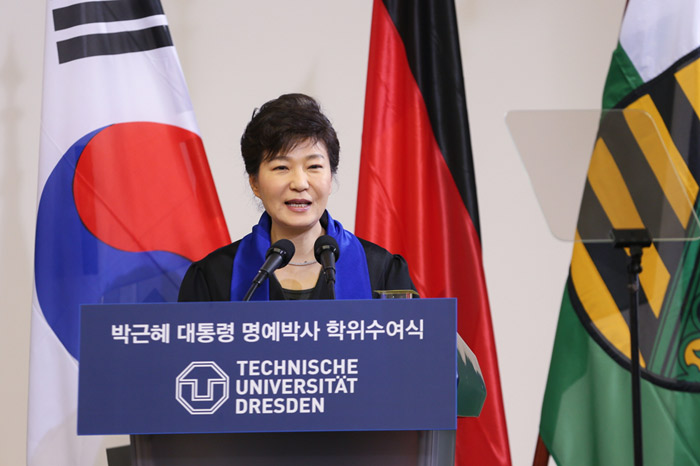
President Park Geun-hye delivers a speech after receiving an honorary doctorate degree in law from the Dresden University of Technology on March 28 during her state visit to Germany. (photo: Cheong Wa Dae)
President Park said that Korea must tear down the barriers in its march toward a new future of unification. By “barriers,” she listed the, “wall of military confrontation,” “wall of distrust,” “socio-cultural wall” and “wall of isolation,” which all exist between the two Koreas. “All of these curtains must be swept away if we are to unite the Korean Peninsula. In their place, we must build a new kind of Korean Peninsula, a peninsula free of nuclear weapons, free from the fear of war and free to enjoy life, peace and prosperity,” she said.
In regard to her “agenda for humanity,” one of her three proposals, President Park said, “We must help ease the agony of separated families." To this goal, she said that Seoul will reach out to Pyongyang to discuss concrete ways to achieve this and engage in the necessary consultations with international bodies like the International Committee of the Red Cross. She also said that South Korea will expand humanitarian assistance to ordinary North Koreans. The president said that her administration will work with the U.N. to implement a program to provide health care support for pregnant mothers and infants in North Korea during their first 1,000 days of pregnancy and child-rearing.
Regarding the "agenda for co-prosperity," President Park proposed that South and North Korea should collaborate to set up “multi-farming complexes” that support agriculture, livestock and forestry in regions of the North suffering from no industry and deforestation. “Working together, from sowing to harvesting, will enable South and North Korea to not just share the fruits of our labor, but also our hearts,” said the president.
By doing so, she said, “The bonds of trust will begin to blossom between the two sides, and then we can start to look at larger forms of development cooperation.” The president said that Korea could invest in infrastructure-building projects where possible, such as in transportation and telecommunications, in order to help make life less uncomfortable for ordinary North Koreans.
“Should North Korea allow South Korea to develop its natural resources, the benefits would accrue to both halves of the peninsula. This would organically combine South Korean capital and technology with North Korean resources and labor and lead to the eventual formation of an economic community on the Korean Peninsula,” she added.
Mentioning the ongoing Rhajin-Khasan joint project, which involves both Koreas and Russia, the president said that Seoul will push forward collaborative projects involving both Koreas and China, centered on the North Korean border city of Sinuiju, in order to promote shared development on the Korean Peninsula and in Northeast Asia.
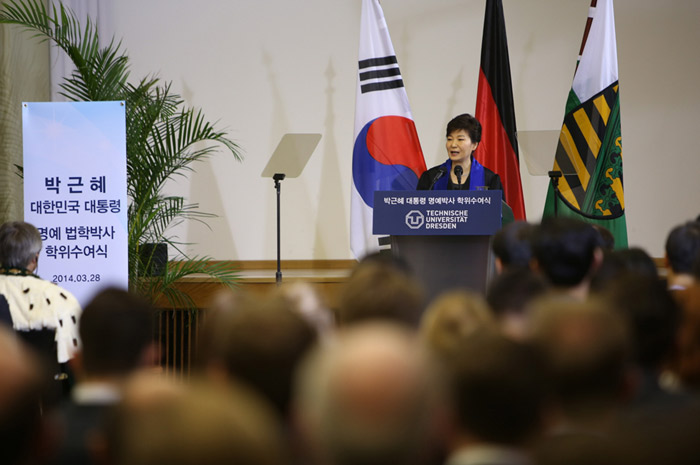
The audience listens to Park Geun-hye’s speech at the Dresden University of Technology, Germany, on March 28. (photo: Cheong Wa Dae)
In regard to the "agenda for integration," President Park said that her administration will encourage exchanges in historical research and preservation, culture and the arts, and sports, rather than politically-motivated projects or promotional events, in order to promote genuine people-to-people contact. “Should North Korea so desire, we would be happy to partner with the international community to share our experience in economic management and developing special economic zones, and to provide systematic education and training opportunities related to finance, tax administration and statistics,” said the president. To make these plans come true, she proposed Pyongyang and Seoul jointly establish an “inter-Korean exchange and cooperation office.”
President Park repeatedly proposed that both Koreas and the U.N. should build an international peace park inside the demilitarized zone (DMZ). “This international peace park would presage the replacement of tension with peace along the DMZ, division with unification, and conflict in Northeast Asia with harmony. If South and North Korea could shift the adversarial paradigm that exists today, build a railway that runs through the DMZ and connect Asia and Europe, we would see the makings of a genuine 21st century silk road across Eurasia and be able to prosper together,” she said.
President Park said that Pyongyang must choose to denuclearize in order to make the dream of one united Korean Peninsula come true.
“I hope North Korea abandons its nuclear aspirations and returns to the six-party talks with a sincere willingness to resolve the nuclear issue, so it could then look after its own people,” said the president. She promised that Seoul would be the first to offer its active support, including for its much needed membership in international financial institutions, and help with attracting international investment if Pyongyang makes the strategic decision to forgo its nuclear program. “If deemed necessary, we can seek to create a Northeast Asia Development Bank with regional neighbors to spur economic development in North Korea and surrounding areas,” she added.
By Wi Tack-whan, Yoon Sojung
Korea.net Staff Writers
whan23@korea.kr
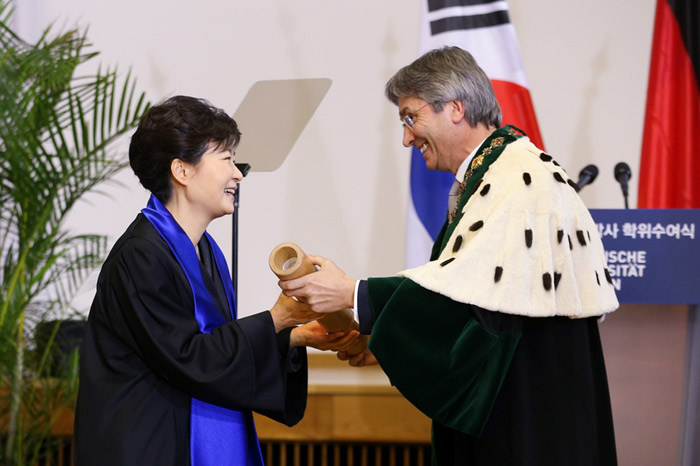
President Park Geun-hye (left) receives an honorary doctorate degree in law from the rector of the Dresden University of Technology, Prof. Hans Müller-Steinhagen, in Dresden, Germany, on March 28. (photo: Cheong Wa Dae)
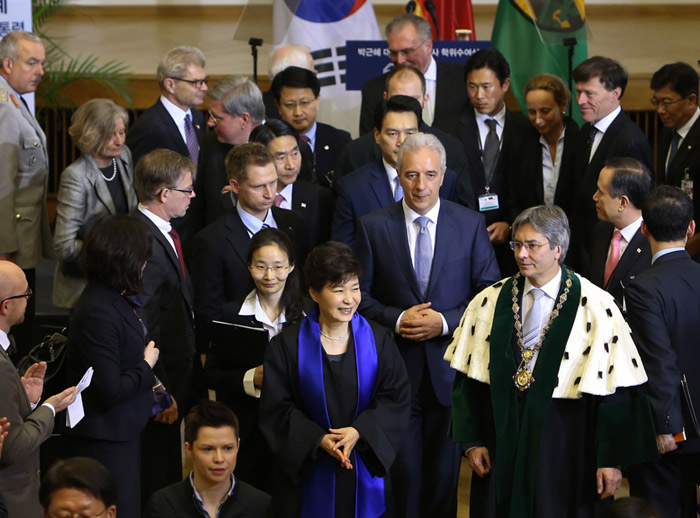
President Park Geun-hye (center) receives a standing ovation as she enters the hall to receive an honorary doctorate degree in law from the Dresden University of Technology in the German city on March 28. (photo: Cheong Wa Dae)
